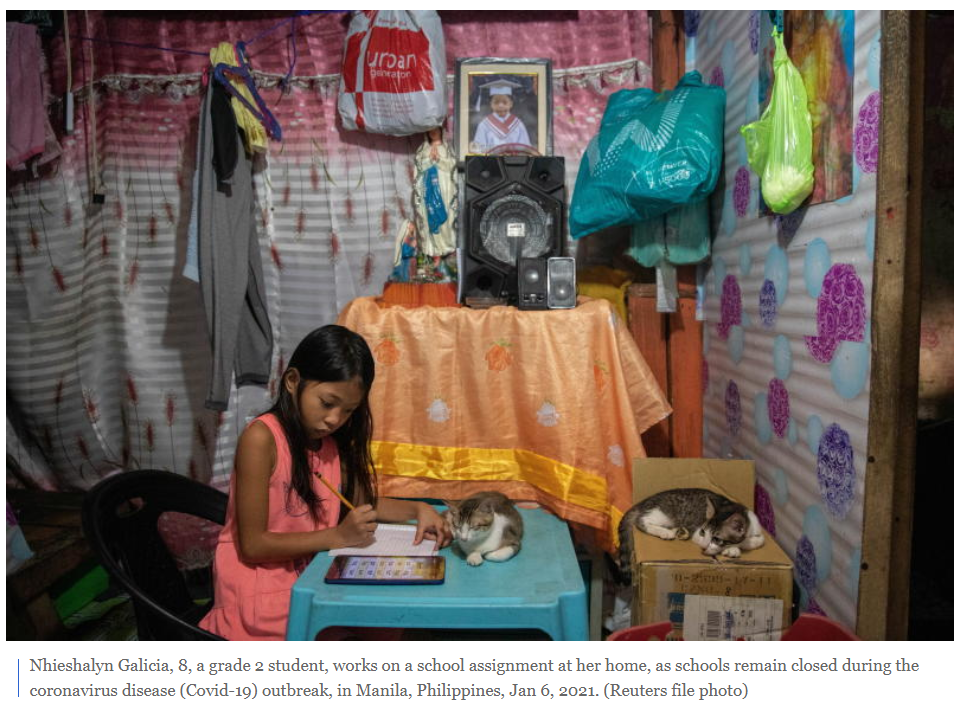Economic recovery in Philippines hinges on kids leaving lockdown
For CK Colindres and her two children, 12 and 2, weekends were always spent strolling in malls and dining out in the Philippine capital of Manila. That all changed when the pandemic struck.
They’ve been cooped up at home since the government ordered minors to stay indoors to curb virus transmissions, the only country in Southeast Asia to impose such restrictions, where children and teens make up over 40% of the population.
The 40-year-old mother is among the millions of parents officials need to go out and spend more, hoping to reinvigorate a consumer-led economy that plunged into recession last year. To do that, it’s becoming clear the government needs to lift restrictions on those parents taking their children with them.
“A big part of the economy doesn’t function” when children aren’t allowed out, Economic Planning Secretary Karl Chua said last month. The 11.5% drop in gross domestic product in the third quarter could have been shallower by 4 percentage points if there were no restrictions on family activities, he said. The government forecasts growth at 6.5% to 7.5% this year.
Half of consumer demand isn’t likely to return if the restrictions on minors remain, Chua said. Parents are also the largest contributors to the nation’s 574 billion-peso 357 billion baht) informal dine-out market, including fast food restaurants, he added.
Efforts by President Rodrigo Duterte’s administration to balance health and economic risks have been challenged by the emergence of a more-contagious strain of the coronavirus. His office late Monday reversed a decision announced only on Friday to lower the age restrictions, reinstating an order preventing children under 15 from leaving home. Duterte said the move was a precaution against the new variant and “that order will subsist until such time that everybody will be safe by the vaccine.”
The Philippine policy has been driven by a concern that children can spread the virus within the extended households that are common in the country, including to grandparents or elderly relatives who are most vulnerable.
The restrictions on minors stand out globally. Countries including France have kept schools open during their latest lockdowns, while others like Singapore exempt young children from mask-wearing mandates. There’s mounting concern that isolating kids will exact a social and mental toll, especially on those from disadvantaged backgrounds.
Singapore Example
The Philippines has the second-highest number of coronavirus infections in Southeast Asia, with more than 500,000 cases. The nation also has one of the region’s deepest pandemic-induced economic slumps, with recovery momentum expected to be weaker than its peers due to a more conservative outlook on fiscal stimulus.
“The example of other countries might shed some light. In Singapore, where schools reopened relatively quickly after the circuit breaker period in June, overall retail sales have already returned to near pre-Covid levels by November,” said Euben Paracuelles, Singapore-based economist at Nomura Holdings Plc.
“The caveat is that the authorities were strict in implementing the remaining safe-distancing measures,” Paracuelles said. “So compliance was high, limiting transmissions and allowing further economic reopening by December.”
Spending will improve if the government builds confidence by controlling the virus outbreak, said Dan Roces, chief economist at Security Bank Corp in Manila. “There is a greater chance that parents will let kids go out if their own confidence is better.”
Beyond Economics
There’s more upside to allowing kids outdoors than just a boost to the economy, according to Stella Quimbo, a congresswoman representing Marikina, part of the sprawling Metropolitan Manila, and a former economics professor at the University of the Philippines. The capital region accounts for about a third of the economy and more than half of the nation’s coronavirus cases.
“Lifting movement restrictions on the youth will not only help stimulate the economy, but will also help stimulate their minds and reduce the risks of mental health problems,” said Quimbo. “They have been locked up inside their homes for so long. We need to balance the problems of Covid and mental health.”
There might be some hesitancy if restrictions are eased. Colindres, for instance, said she would still opt to stay indoors with her kids.
“Health is top priority for me and my husband,” she said. “We don’t want to take the risk of our children getting sick. Malls and recreation areas will always be there anyway.”
Source: https://www.bangkokpost.com/business/2057351/economic-recovery-in-philippines-hinges-on-kids-leaving-lockdown


 Thailand
Thailand




